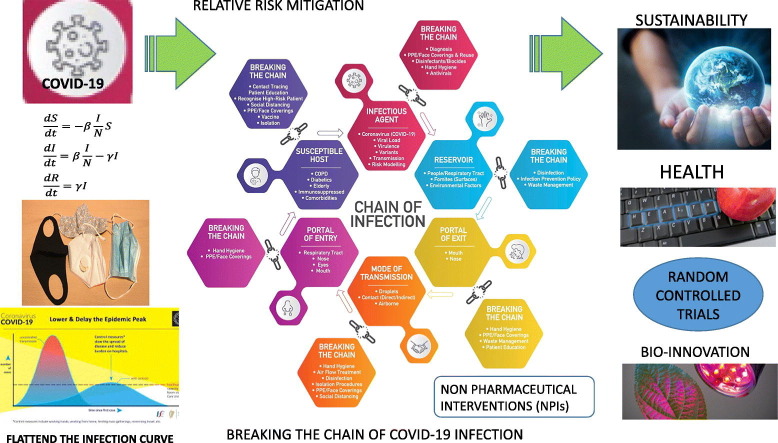- Record: found
- Abstract: found
- Article: not found
Disposable face masks and reusable face coverings as non-pharmaceutical interventions (NPIs) to prevent transmission of SARS-CoV-2 variants that cause Coronavirus disease (COVID-19): role of new sustainable NPI design innovations and predictive mathematical modelling.

Read this article at
Abstract
Best-published evidence supports the combined use of vaccines with non-pharmaceutical interventions (NPIs), to reduce the relative risk of contracting severe acute respiratory syndrome coronavirus 2 (SARS-CoV-2) that causes COVID-19; this will enable a safe transition to achieving herd immunity. Albeit complex, the strategic public health goal is to bundle NPIs to keep the basic reproduction number R 0 below one. However, validation of these NPIs is conducted using random clinical trials, which is challenging in a swiftly moving pandemic given the need for recruiting large participant cohort over a longitudinal analysis period. This review highlights emerging innovations for potentially improving the design, functionality and improved waste management of disposable face masks such as filtering facepiece (FFPs) respirators, medical masks, and reusable face coverings to help prevent COVID-19. It describes use of different mathematical models under varying scenarios to inform efficacy of single and combined use of NPIs as important counter-measures to break the cycle of COVID-19 infection including new SARS-CoV-2 variants. Specifically, factors potentially influencing different face mask designs and functions are addressed. Demand for face masks during COVID-19 pandemic keeps increasing, especially foe FFPs worn by medical workers. Collaborative and well-conducted randomised controlled trials are required to generate reliable data; however, current use of systematic reviews of best available evidence can be considered to guide interim policies.
Graphical abstract
Highlights
-
•
Face masks and face coverings are mainstay non-pharmaceutical interventions (NPIs) to help prevent COVID-19
-
•
Random controlled trials will inform efficacy of relative risk (RR) for single and combined use of NPIs
-
•
Mathematical modelling will inform efficacy of NPIs to address COVID-19 risk multipliers
-
•
Surge in new face mask design, functionality and material innovation reflects need for sustainable PPE
-
•
Other RR factors include emerging winter conditions, religious and cultural events that also challenge NPIs

